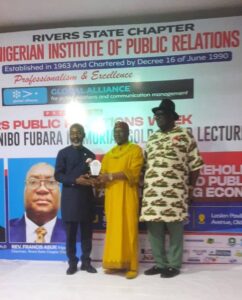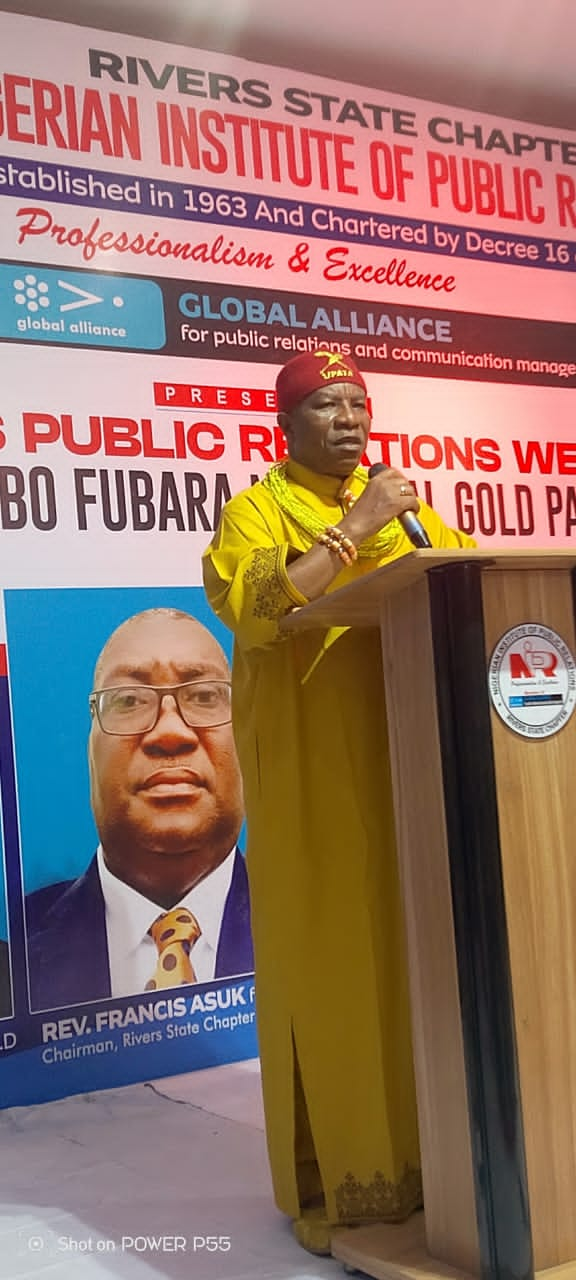A traditional ruler in Rivers State, Dr. Felix E. Otuwarikpo, Eze Igbu Upata III of Upata Kingdom, in Ahoada Local Government Area, has called for a complete rethinking of community development in the Niger Delta, urging stakeholders to use public relations as a strategic tool for sustainable growth and social transformation.
Speaking at the 2025 Alabo O.B. Fubara Memorial Gold Paper Lecture organized by the Nigerian Institute of Public Relations (NIPR), Rivers State Chapter, as part of activities marking its maiden Public Relations Week, Eze Otuwarikpo said that the enduring underdevelopment of the Niger Delta stems not only from poor governance and environmental degradation but also from the lack of meaningful engagement with the very people development is meant to serve.

Presenting a paper titled “Empowering Community Development in the Niger Delta: Harnessing Public Relations for Sustaining Growth,” the traditional ruler argued that for genuine progress to occur, the people must be treated as partners, not mere recipients of government benevolence.
He expressed the opinion that government must partner with communities to tackle poverty, rebuild trust, and ensure sustainable development in oil-rich region.
“We cannot continue to design policies for our communities without involving them in the conversation.
“Public relations provides that bridge of understanding, participation, and trust that can turn lofty development ideas into living realities,” he said.
Tracing the history of Nigeria’s development trajectory, Dr. Otuwarikpo lamented that since independence in 1960, most government efforts have focused disproportionately on urban areas, leaving the rural majority, especially in the Niger Delta, in a cycle of poverty and neglect.
According to him, the colonial masters set the stage for this inequity through an exploitative model that viewed rural Nigeria as a reservoir of raw materials and food for the cities, noting that “the British colonial interest in rural Nigeria was characterised by two-pronged exploitation—resource extraction and food production for urban comfort.”
“Unfortunately, that pattern has continued long after independence,” Dr. Otuwarikpo said, adding that despite decades of intervention programmes such as the Directorate of Food, Roads and Rural Infrastructure (DFRRI), National Directorate of Employment (NDE), Oil Mineral Producing Areas Development Commission (OMPADEC), and the Niger Delta Development Commission (NDDC), rural life in the region has remained poor.
“We have had too many programmes and too little participation,” he lamented. “Policies without communication, and projects without local ownership, are doomed to fail.”
“Sadly, the Niger Delta’s oil-rich landscape remains mired in poverty, underfunded community projects, and rural-urban migration. Development initiatives are often disrupted by political interference and lack of continuity. Many communities still face poor health care, limited education, low income, and insecurity, which are symptoms of decades of neglect,” he stated
The monarch, who is also a Fellow of the NIPR, emphasized that public relations offers a framework for dialogue and inclusion, which can help rebuild trust between governments, corporations, and the people. He described communication as the missing link in most rural development efforts.
Empowerment in the Niger Delta, he stated, is not just about government intervention but about partnerships—where communities take initiative, and governments provide enabling support.
According to him, development can only thrive when communities and governments jointly pursue shared goals. He said for such a collaboration to succeed, government must deploy persuasive, transparent communication to unite its efforts with the aspirations of the people
“Development is not just about roads, schools, or electricity,” he said. “It is about human connection, about people believing they matter and having a say in shaping their future. That is the essence of effective public relations,” the royal father noted.
Eze Otuwarikpo called for a paradigm shift that integrates traditional leadership, community groups, and the media into development planning and execution. He said the Niger Delta’s narrative should change from one of agitation and neglect to a story of partnership, innovation, and sustainable progress.
“The Niger Delta must begin to tell its own story,” he declared. “We must communicate our aspirations with clarity, responsibility, and unity of purpose. Only then can we take ownership of our development journey.”
The lecture which took place at the La Sien Pavilion in Port Harcourt, also celebrated the enduring legacy of Alabo O.B. Fubara, one of the founding fathers of the NIPR in Rivers State, remembered for his courage, professionalism, and commitment to ethical communication.
“Alabo Fubara believed in truth, dialogue, and the transformative power of communication,” Dr. Otuwarikpo said. “As we honour his memory, we must rededicate ourselves to using public relations as a tool to rebuild trust, empower our people, and sustain development in the Niger Delta,” he declared.
The event drew leading figures from the media, academia, and traditional institutions, all of whom agreed that the time had come to redefine community development through inclusive communication and reportage.




